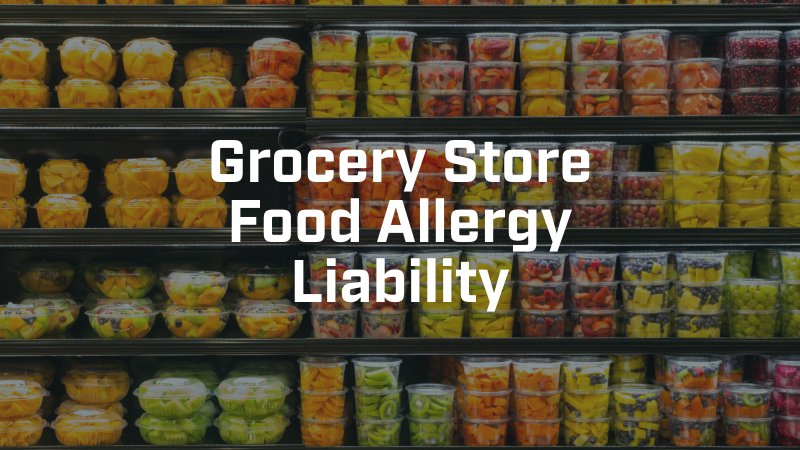Grocery Store/ Supermarket Food Allergy Lawsuit
Grocery stores have a responsibility to protect customers with food allergies by providing accurate labeling, minimizing cross-contamination, and ensuring staff are well-trained. When stores fail to uphold these standards, they can be held liable for resulting harm.
Grounds for Grocery Store / Supermarket Food Allergy Lawsuits
Food allergy lawsuits against grocery stores typically arise from scenarios where their actions or inactions lead to allergic reactions. Common causes include:
Mislabeling or Incomplete Labeling
- Pre-packaged products sold in stores must include a full list of ingredients and identify major allergens like peanuts, tree nuts, dairy, wheat, soy, eggs, fish, and shellfish.
- If a product’s label fails to disclose these allergens or provides inaccurate information, the store may share liability along with the manufacturer.
Cross-Contamination in Store-Prepared Foods
Many supermarkets offer freshly prepared foods, such as bakery items, deli products, or salad bar options. Cross-contamination can occur when utensils, equipment, or surfaces are not adequately cleaned between handling allergenic and non-allergenic foods.
Improper Staff Training
Grocery store employees may unintentionally give incorrect information about ingredients or fail to follow allergy protocols in handling and packaging food.
Failure to Provide Warnings
Stores that repackage food without providing allergen warnings on the new labels may be held accountable for resulting reactions.

Who Can File a Lawsuit?
Individuals who have experienced severe allergic reactions due to grocery store negligence may be eligible to file a lawsuit. Eligible parties include:
- Allergic Individuals: Customers who experience an allergic reaction, such as anaphylaxis, after consuming mislabeled or cross-contaminated products.
- Legal Guardians: Guardians or parents of minors who suffer allergic reactions.
- Family Members of Deceased Victims: In cases of fatal allergic reactions, family members can pursue wrongful death claims.
Proving a Grocery Store Food Allergy Lawsuit
Succeeding in a food allergy lawsuit against a grocery store or supermarket depends upon the legal theory on which you base your claim. Several legal theories can apply to these cases, including:
Negligence
Demonstrating that the store failed to act with reasonable care, such as by neglecting to follow allergen protocols or failing to ensure proper labeling. Key elements include:
- Duty of Care: The store had an obligation to provide safe food or properly warn customers of allergens.
- Breach of Duty: Show that the store did not follow proper protocols, such as failing to clean equipment, prevent cross-contamination, or label allergens.
- Causation: Establish that this breach directly caused your allergic reaction.
- Damages: Evidence of losses, such as medical bills, lost income, pain and suffering, etc.
- Evidence Needed: Inspection records, witness testimony, or expert reports showing improper handling or inadequate warnings.
Strict Liability
Strict liability holds the store accountable for selling a defective product (e.g., mislabeled food), regardless of negligence. To succeed under this theory, you must prove:
- Product Defect: The food was unreasonably dangerous due to mislabeling, contamination, or undisclosed allergens.
- Causation: The defective product directly caused your allergic reaction.
- Evidence Needed: The product packaging, lab tests confirming contamination or allergens, and proof of purchase. You do not need to show that the store acted negligently—only that the product was defective.
Breach of Warranty
Breach of warranty applies when a product fails to meet express or implied promises about its safety. To prove this claim, you must show:
- Express Warranty: The store or manufacturer explicitly guaranteed the product was safe for consumption (e.g., labeled “allergen-free”).
- Implied Warranty: Even without explicit guarantees, food products are expected to be safe for their intended use.
- Breach: Demonstrate that the product failed to meet these guarantees, leading to your allergic reaction.
- Evidence Needed: Labels, advertisements, or other assurances provided by the store or manufacturer, along with medical records proving the reaction was caused by the product.
Each legal theory has distinct requirements for proof. An experienced food allergy attorney can help identify the strongest legal theory for your case and gather the necessary evidence to secure fair compensation.
Types of Compensation Available
Victims of grocery store or supermarket food allergy cases may seek various forms of compensation, including:
- Medical Expenses: Reimbursement for emergency treatment, hospitalization, medications, and ongoing care.
- Lost Wages: Compensation for income lost due to time off work for recovery or caring for the victim.
- Pain and Suffering: Damages for physical pain, emotional distress, and reduced quality of life.
- Wrongful Death Damages: Compensation for funeral expenses, loss of companionship, and financial support in fatal cases.
- Punitive Damages: In cases of gross negligence, punitive damages may be awarded to deter similar future conduct.
Contact Us Today
If you or a loved one has suffered a severe allergic reaction from a product bought at a grocery store or supermarket, speak to our Food Allergy Lawyer today. We offer free consultations, call (833) 330-3663 or send us a message online.
